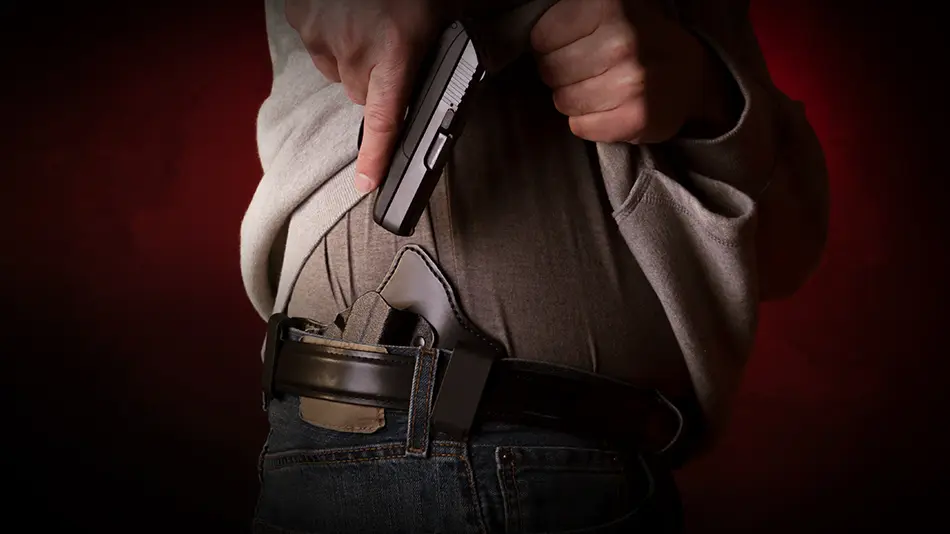
Can a judge sign an order allowing police to seize your guns without you even breaking a single law? In recent years, there has been a nationwide push for “extreme risk protective orders” or “red flag” laws specifically designed to remove firearms from people accused of engaging in conduct or making statements that others may deem “dangerous.” You’ve probably heard about them in the news recently; but what are they? What do you need to know about them, and how could they be used to take away your Second Amendment rights? Let’s look at the history of these laws and how Illinois uniquely falls on this hotly debated area.
The History of Red Flag Laws
Red flag laws entered prominent national discourse in 1999 when Connecticut passed the first one of its kind because of a mass shooting at the Connecticut Lottery headquarters. Lawmakers in Connecticut intended this law to target individuals with specific mental health conditions and prevent them from accessing firearms.
More recently, on February 14, 2018, a 19-year-old former student opened fire at Marjory Stoneman Douglas High School in Parkland, Florida, horrifically killing 17 people and injuring 17 others. There was an immediate national outcry to “do something” to stop what the media has frequently dubbed “gun violence.” When information emerged that the shooter had documented mental health issues, lawmakers across the country began pushing for laws to take away guns from individuals whose behavior raised a “red flag” that they could be a threat to themselves or others.
In theory, the purpose of these laws is to identify an individual who exhibits early warning signs of danger and prevent a criminal act from occurring by preemptively disarming them. However, there’s an obvious irony: with red flag legal proceedings, the person’s firearms are seized, but the individual may be quickly released back into society, free to pursue whatever misdeeds they might choose to do.
Many of the states with red flag laws currently on the books allow for an enforceable court order that prevents the person from owning, purchasing, possessing, or transporting firearms and ammunition for a specified period of time. Several jurisdictions also allow the extension of these orders if the affected individual is still “deemed a threat.”
For example, under California’s red flag law (called a “gun violence restraining order”), a person could be prohibited from owning, purchasing, possessing, or transporting firearms and ammunition initially for between one and five years, with the potential for the order to be renewed and extended indefinitely. California Penal Code §§ 18170-18197 lays out the process by which any qualifying person may ask to extend the red flag order within three months of its expiration. The order will be extended if the court finds that the person still poses a significant danger of causing personal injury to themselves or another by controlling, owning, purchasing, possessing, or receiving a firearm, ammunition, or magazine, and all other conditions for renewal are satisfied.
A Californian subject to a red flag order may petition the court only once per year and ask for it to be lifted; which could entail another costly and time-consuming legal proceeding.
As of the publish date of this article, 19 states and the District of Columbia have enacted versions of red flag laws. How do things stand for Illinois?
Red Flag Laws in Illinois
There is a red flag law currently on the books in Illinois called the Firearms Restraining Order Act. 430 ILCS 67/1. This act allows a spouse, parent, child, stepchild, blood relative, current roommate, or law enforcement officer to petition a court for a Firearms Restraining Order (“FRO”) against an individual (the respondent) who poses an immediate and present danger of causing personal injury to themselves or another person by having in their custody or control, purchasing, possessing, or receiving a firearm.
Each time an FRO is issued, it is effective for a maximum of six months, with the possibility of indefinite renewal by the petitioner. If the petitioner believes the respondent poses an immediate danger, he or she may request an emergency hearing in which an ex parte (an order issued without the respondent’s knowledge or presence) Emergency Firearms Restraining Order (“EFRO”) may be issued if a court finds probable cause to do so. If the court issues an EFRO, it shall, upon a finding of probable cause that the respondent possesses firearms, issue a search warrant directing a law enforcement agency to seize the respondent’s firearms. Furthermore, the respondent must relinquish his or her Firearms Identification Card and Concealed Carry License.
If an EFRO is granted, the court must schedule a full evidentiary hearing within 14 days from the date the EFRO was issued, with notice to the respondent, to determine if a 6-month FRO shall be issued. If the petitioner does not request an EFRO or one is not granted by the court, then a full evidentiary hearing must be conducted within 30 days from the filing of the petition for an FRO. At the evidentiary hearing, the petitioner will have the burden to prove by clear and convincing evidence that the respondent poses an immediate and present danger of causing personal injury to themselves or another person by having in their custody or control, purchasing, possessing, or receiving a firearm. If the petitioner meets this higher burden of proof, then the court will grant a 6-month FRO. A petition for renewal of the FRO can be filed at any time within the last three months prior to the end of the FRO’s term.
Potential Future Legislation in Illinois
There have been no signs of new legislation aimed at adding to our present red flag law here in Illinois. Our state legislators and Governor have been overwhelmed this past year with the pandemic and have not focused on any new gun legislation. With the pandemic winding down, I fear that firearm regulation is now in their sights. Be diligent.
If you have questions about red flag laws or any other gun-related legislation, call U.S. LawShield and ask to speak to your Independent Program Attorney.
The information provided in this publication is intended to provide general information to individuals and is not legal advice. The information included in this publication may not be quoted or referred to in any other publication without the prior written consent of U.S. LawShield, to be given or withheld at our discretion. The information is not a substitute for, and does not replace the advice or representation of a licensed attorney. We strive to ensure the information included in this publication is accurate and current, however, no claim is made to the accuracy of the information and we are not responsible for any consequences that may result from the use of information in this publication. The use of this publication does not create an attorney-client relationship between U.S. LawShield, any independent program attorney, and any individual.





Leave A Comment